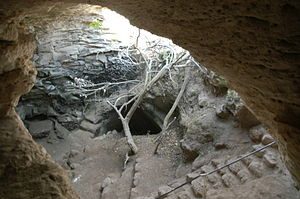
We know the story of how Christianity started. The scholarly explanation is essentially a paraphrase of the narratives we read in the Gospels and Acts. The disciples had been fully expecting Jesus to take charge and begin to drive out the Romans when he went to Jerusalem so were dismayed when he let himself by captured and crucified instead. Something happened in the ensuing days, something inexplicable, or at least beyond historical inquiry: the disciples came to believe that Jesus was still alive and were accordingly inspired to preach the good news of Jesus who really was the Christ (Messiah), that he died and rose again, etc.
(Funny that they never say the disciples “came to believe he had been crucified” because according to the gospels they all fled the scene, were not present at his trial and had no better word than the humble witness of a few ladies who claimed to have seen Jesus both crucified and resurrected.)
Anyway, as the conventional explanation goes, the disciples were so confused at first by the demise of their teacher and were struggling to make sense of their subsequent feelings that they delved into the scriptures for answers. How could the one they so believed was the messiah or christ be crucified?
Until then it had been inconceivable for any Jew to interpret those scriptures in a way that produced a messiah destined to suffer and die. The scriptures said the messiah would overthrow Israel’s enemies and establish the rule of God on earth. Nonetheless, the disciples were so moved by their recent trauma that they finally found a way to convince themselves they had been right all along: Jesus really was the Christ and he really did come alive again after his crucifixion. So cogent were their explanations of the scriptures that many others who heard them preach also believed.
Such a radical reinterpretation of the messiah and the scriptural grounds for its support was so scandalous to most other Jews and the Jewish authorities that they gave them a hard time, stoning them, whipping them, martyring them, and so forth. And that’s how Christianity and the New Testament writings were born.
So what do we make of the responses of the followers of another would-be messiah who was killed a century later?
There was a second Jewish rebellion against Rome in the early 130s led by Bar Kochba. Apparently many believed he was the messiah doing just what a messiah was supposed to do — fight Romans. There was a famous rabbi named Akiba (or Akiva) who is said to have even pronounced his messiahship and fulfilment of prophecies from the Pentateuch. But he was killed, too.
Now it happens that at some point (we don’t know when with any precision, but the first signs of it indicate it was some time within the first couple of centuries of the Christian era) a belief in a messiah who was to die in battle emerged among Jews. How do we explain the emergence of belief in a dying messiah among the Jews? Some have suggested the idea grew out of the experiences of the followers of Bar Kochba and was a response to their great disappointment when he failed.
It might be interesting for some to have a look at what a scholar from the Department of Hebrew Literature at Jerusalem’s Hebrew University had to say in an article published in 1975. He is outlining the views of some of his peers. It is interesting to compare the explanations with the conventional one for the emergence of the Christian myth.
J. Klausner categorically rejects the claim that the figure of the Messiah who would be killed in battle came into being as a result of the exegesis of Zech 12:10 (and other texts), as Dalman, and others, had proposed; in his opinion, it is not through exegesis that important, new ideas or doctrines are created. Nor does he accept the hypothesis of Jacob Levy, that the concept of the Messiah ben Ephraim was created after the failure of the Bar Kokhba revolt in order to make it possible to preserve the messianic faith in spite of this disaster and also in order “to save the honour of R. Akiva,” who had publicly proclaimed him the Messiah; by making Bar Kokhba, in the guise of Messiah ben Joseph, the forerunner of the “real” Messiah, his defeat could be accepted without denying his messianic function altogether. Klausner rejects this “rationalistic” view, because “articles of creed” are not created intentionally ad hoc, but originate in “deep inner needs” of the people. Moreover, the disappointment after Bar Kokhba’s defeat was so immense, as to make it inconceivable that the people (or the sages) should have continued to look upon him as a genuine messianic figure; and, indeed, there is no indication that this was the case. . . . (Heinemann, Joseph. 1975. “The Messiah of Ephraim and the Premature Exodus of the Tribe of Ephraim”. Harvard Theological Review, Vol. 8, No. 1. p. 2)
Does the logic imply that Christianity began because the disciples were less disappointed in Jesus? But would we not expect a lesser disappointment to lead to disciples packing up everything and going back to their former routines?
Or do scholars really expect us to believe that there was some inexplicable “easter event” that was responsible for Christianity?
